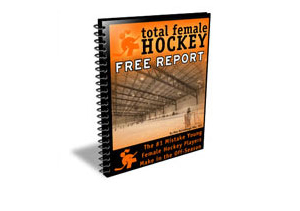It’s All In Your Head
Like most coaches, I’m constantly looking for ways to give my teams
and players an advantage. I recently read an amazing book by Carol
Dweck called “Mindset “and I want to share a key concept from the book
with you as I know it will help girls hockey players, parents and coaches alike to take
their mental game to the next level.
In “Mindset”, the author focuses on the difference between a FIXED mindset
and a GROWTH mindset. In a nutshell, players with a fixed mindset think
that every game they play has to be mistake-free. In their minds, anything
less than perfection is unacceptable. They do not look at mistakes as an
opportunity to learn, they look at them as a sign of weakness.
Quite often these players have a lot of natural talent and haven’t had to
work too hard to get where they are in terms of ability. Coaches and teammates
often tell them how good they are. And while some of these players may be cocky,
it’s not always the case. Whether they are cocky or not on the outside, they are extremely hard on themselves with their own self-talk.
When you have a fixed mindset and everyone tells you how good you are,
making mistakes means that either everyone is lying to you or you really are bad.
When these players are told they need to work on something, they see it as a sign of weakness and they get down on themselves. These are players who get frustrated
very easily and seem to believe that talent is a fixed thing – you either have it or you don’t.
These players can be extremely successful – but only up to a point. As they
reach higher and higher levels, and the chance of making mistakes goes up and up,
they tend to question themselves and their abilities more and more.
On the other hand, players with a GROWTH mindset don’t see mistakes as a
sign of weakness or a lack of ability. They see it as an opportunity to learn and grow.
Typically, these players aren’t “naturals” and have already had to fight and claw
to get to the level they are at now. These players definitely believe in the quote –
“you don’t always get what you wish for, you get what you work for”.
These players are always looking for ways to get better – no matter whether
they are having a lot of success or they are struggling. Their physical performance
may change, but their mental approach always stays the same. These players
always want to be better and are willing to do the work needed to get to the next level.
The interesting thing is that players with a growth mindset can be just as hard
on themselves as those with the fixed mindset are – the difference is how they
choose to react to the challenges in front of them. The fixed mindset players try
to hide their weaknesses while the growth mindset players work diligently to
improve them.
As a coach, it is critical to know which players on your team have a fixed mindset and who has a growth mindset. Players aren’t always 100% one or the other, but most
teams have at least one or more players who fall into the fixed mindset category.
These are the players that we must reach out to and help them understand and
hopefully adopt more of a growth mindset. After all, hockey is a game of mistakes,
and if these fixed mindset players can’t react well after making a mistake,
it will have a negative effect on their play as well as that of the team.
Immediately after I finished this book, I’ve started to speak to my players differently.
The truth is, we can all benefit from adopting more of a growth mindset,
especially as the playoffs and tryouts approach and everyone becomes so
laser-focused on performance outcomes. Growth mindset players, coaches and teams honor the process – they know that lasting success takes a lot of work and embrace that opportunity to learn from their mistakes instead of making excuses or laying blame.
Our mental TV is fully under our own control. Only we can change the channel
from a fixed to growth mindset.
Your friend and coach,
Kim
Kim McCullough, MSc, YCS
Director, Total Female Hockey
Girls Hockey Director, PEAC School For Elite Athletes

